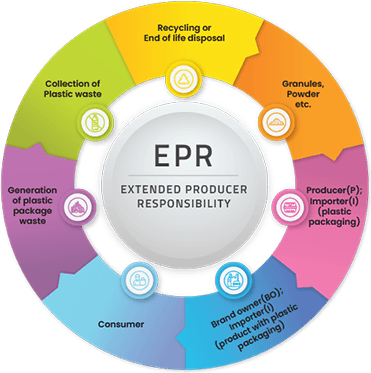
Back in January 2025, a Retail Chain based in Mumbai came to us with a silent crisis brewing.
They had signed up with three different PROs (Producer Responsibility Organizations) over the past year for their plastic waste obligations—but none were delivering consistent documentation. When CPCB called for audit data, they couldn’t produce valid disposal certificates.
The result? A threat of de-registration. The client was days away from being publicly blacklisted.
We stepped in, verified every transaction, onboarded CPCB-approved partners, and rebuilt their compliance trail. In under 45 days, we replaced 3 unreliable PROs with CPCB-verified partners, giving them not just compliance, but peace of mind.
That incident isn’t rare.
A recent FICCI report revealed that 62% of Indian companies under Plastic EPR face challenges in reverse logistics traceability or paperwork compliance.
That’s where a proper Plastic Waste EPR Compliance Service like ours makes all the difference.
✅ Why Plastic Waste EPR Compliance Really Matters in 2025?

1. It’s Not Just a Regulation—It’s a License to Operate
India’s updated Plastic Waste Management Rules (2022) make it mandatory for all PIBOs (Producers, Importers, Brand Owners) to:
- Register with CPCB
- Submit an annual EPR plan
- File quarterly returns
- Provide proof of plastic collection and disposal
Failure =
- Penalties up to ₹1 crore
- Cancellation of EPR license
- Public blacklisting by CPCB
2. Your Customers Are Watching
Large marketplaces like Amazon and Flipkart now require EPR registration proof before onboarding. Even your B2B buyers might ask for your CPCB registration number.
3. Sustainability Is No Longer a Buzzword
With ESG disclosures becoming mandatory and Gen-Z consumer behavior shifting, plastic EPR compliance is now a reputational asset, not just a legal checkbox.
🧭 Our 6-Step Plastic Waste Compliance Framework at Prgenix

We don’t just file your forms—we run your entire compliance engine. Here’s how we handle it:
Step 1: EPR Applicability Check & Waste Stream Audit
We begin with:
- Mapping of packaging types (mono/multi-layered)
- Identification of PIBO status
- SKU-wise material consumption
Most clients are shocked to learn they’ve been under-declaring their waste types.
Step 2: EPR Plan Drafting & CPCB Registration
We prepare a rock-solid EPR Plan that includes:
- Annual collection targets
- PRO onboarding strategy
- Reverse logistics blueprint
We submit it to CPCB and ensure fast-tracked approval.
Step 3: Partnering with CPCB-Verified PROs
We handpick:
- Collection agencies with active CPCB licenses
- Recyclers offering certified disposal
- Logistics firms providing geo-tagged pickup records
No blacklisted vendors. No shady documentation.
Step 4: EPR Return Filing (Q1–Q4)
We file your quarterly returns on the CPCB EPR portal and maintain an internal dashboard with:
- Collection logs
- Recovery records
- Invoice reconciliation
- Barcode tagging if required
Step 5: Annual Summary & Deviation Management
We prepare and file your annual return, manage shortfall justifications, and coordinate with CPCB in case of deviation notices.
Step 6: Plastic Credit Tracking
We track your recyclable surplus and help monetize plastic credits in state-wise EPR ecosystems.
📈 Case Study: Compliance Turnaround in 45 Days
Earlier this year, a Retail Chain based in Mumbai came to us after being ghosted by multiple PROs. They had:
- No valid pickup certificates
- Incomplete disposal records
- A pending CPCB audit within 30 days
At Prgenix, we:
- Onboarded two new PROs with trackable waste routing
- Collected fresh documentation
- Filed corrected backdated returns
- Delivered a new compliance dashboard
Result? They stayed in business, passed their CPCB audit, and now enjoy auto-notifications for every filing cycle.
💡 Advanced Tips Most Plastic EPR Consultants Won’t Tell You

1. Always Segregate Multi-Layered and Mono-Layered Plastics
Each type has different recovery targets. Misreporting will trigger audit flags.
2. Don’t Rely on Generic PROs
Work only with PROs who’ve filed their own returns and are updated on CPCB’s EPR portal. We verify every one.
3. Maintain SKU-Wise Packaging Records
It’s not enough to say “plastic wrappers.” You must show how much plastic was used per product per state.
4. Track Every Pickup Log Digitally
Geo-tagging, timestamps, vehicle IDs—all matter. CPCB now cross-verifies random batches.
5. Have a Shortfall Management Plan
Didn’t meet your targets? Don’t panic. File a deviation report and adjust in next quarter. We automate this process.
❓FAQs – People Also Ask

Q1. What is Plastic Waste EPR compliance?
It’s the regulatory requirement for businesses to take responsibility for the collection and recycling of the plastic they generate, especially post-consumer use.
Q2. Who needs to comply with Plastic Waste EPR?
All Producers, Importers, and Brand Owners (PIBOs) involved in the use or distribution of plastic packaging in India.
Q3. Is Plastic Waste EPR registration mandatory?
Yes. You must register on the CPCB EPR portal and receive approval before product distribution or sales.
Q4. What documents are required for EPR compliance?
- GST certificate
- PAN card
- Board resolution or authorization letter
- SKU-wise packaging data
- Previous sales records
Q5. How often do I need to file EPR returns?
You must file quarterly returns and an annual summary. Each quarter’s return includes waste generation, collection, and disposal records.
🎯 Don’t Let Plastic Waste Derail Your Business
In 2025, Plastic EPR isn’t just a “green” initiative—it’s a hard business requirement. At Prgenix, we help brands:
- Avoid CPCB penalties
- Navigate every waste rule nuance
- Build an audit-ready compliance file
- Stay ahead of every quarterly cycle
Whether you’re a startup or a supply-chain giant—our Plastic Waste EPR Compliance Service gives you the edge, not just the excuse.
GET EPR COMPLIANT